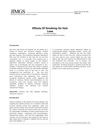 December 2024 in “Frontiers in Pharmacology”
December 2024 in “Frontiers in Pharmacology” Araliadiol may promote hair growth like minoxidil without being toxic.
April 2021 in “International Journal of Research in Dermatology” The combination of minoxidil and finasteride is more effective for hair growth than minoxidil alone.
 October 2023 in “Journal of Drug Delivery Science and Technology”
October 2023 in “Journal of Drug Delivery Science and Technology” Electrospun nanofibers might be a promising new treatment for hair loss.
 3 citations,
August 2011 in “Current Psychiatry Reviews”
3 citations,
August 2011 in “Current Psychiatry Reviews” Family-based treatment is the best outpatient care for stable teens with anorexia, and more research is needed on medication and treatment effectiveness for young people with eating disorders.
 December 2024 in “Asian Journal of Medical Sciences”
December 2024 in “Asian Journal of Medical Sciences” Low iron levels may be linked to hair loss in women with chronic telogen effluvium.
 37 citations,
October 2021 in “Nutrients”
37 citations,
October 2021 in “Nutrients” Vitamin D might help regulate insulin in the body, but taking Vitamin D supplements doesn't clearly prevent or improve type 2 diabetes. More research is needed.
 1 citations,
October 2022 in “Journal of food and nutrition research”
1 citations,
October 2022 in “Journal of food and nutrition research” Cinnamon may help manage obesity and improve conditions related to Polycystic Ovary Syndrome (PCOS).
 1 citations,
May 2023 in “Frontiers in Endocrinology”
1 citations,
May 2023 in “Frontiers in Endocrinology” Autism's genetics are linked with early age of puberty and less hair loss, but not with hormone levels or polycystic ovary syndrome.
 June 2023 in “Journal for international medical graduates”
June 2023 in “Journal for international medical graduates” Smoking increases the risk of hair loss, especially male pattern baldness.
 January 2025 in “Applied Sciences”
January 2025 in “Applied Sciences” Sulforaphane from broccoli may help treat certain cancers, hormone issues, and hair loss.
 8 citations,
October 2022 in “Regenerative Therapy”
8 citations,
October 2022 in “Regenerative Therapy” New regenerative treatments for hair loss show promise but need more research for confirmation.
 March 2023 in “International Journal of Trichology”
March 2023 in “International Journal of Trichology” Using both minoxidil and finasteride together is more effective for male hair loss than using either one alone.
 2 citations,
June 2023 in “Indian journal of dermatology, venereology, and leprology”
2 citations,
June 2023 in “Indian journal of dermatology, venereology, and leprology” Janus kinase inhibitors can regrow hair in alopecia areata but may cause side effects and hair loss may return if treatment stops.
 1 citations,
June 2023 in “Curēus”
1 citations,
June 2023 in “Curēus” PCOS affects nearly 25% of female medical and dental students, impacting their academic and social lives.
January 2023 in “Dermatologic Therapy” Intralesional corticosteroids and 5-alpha-reductase inhibitors are the best treatments for frontal fibrosing alopecia.
 May 2017 in “InTech eBooks”
May 2017 in “InTech eBooks” Hair transplantation can lead to complications like pain, swelling, and rare serious issues, but risks can be reduced with careful practices.
 August 2021 in “Research, Society and Development”
August 2021 in “Research, Society and Development” Minoxidil slightly increased hair volume more than Finasterida, but both reduced hair loss similarly.
 12 citations,
March 2022 in “Frontiers in Nutrition”
12 citations,
March 2022 in “Frontiers in Nutrition” Obesity is linked to various skin conditions and issues, and losing weight can improve these conditions.
 April 2022 in “Brazilian Medical Students”
April 2022 in “Brazilian Medical Students” People with androgenetic alopecia may have a higher risk of severe COVID-19.
 January 2024 in “Jurnal Ilmu Kesehatan Hewan”
January 2024 in “Jurnal Ilmu Kesehatan Hewan” Oreo the dog got better from skin and worm infections after treatment and cleaner living conditions.
 48 citations,
January 2017 in “International Journal of Trichology”
48 citations,
January 2017 in “International Journal of Trichology” Microneedling with platelet-rich plasma and minoxidil improves hair growth more than just minoxidil in men with hair loss.
 2 citations,
September 2022 in “Cytotherapy”
2 citations,
September 2022 in “Cytotherapy” Fat-derived stem cells show promise for treating skin issues and improving wound healing, but more research is needed to confirm the best way to use them.
Nanotechnology shows promise for better hair loss treatments but needs more research for safety and effectiveness.
 1 citations,
January 2021 in “Skin appendage disorders”
1 citations,
January 2021 in “Skin appendage disorders” A woman with alopecia regrew her hair after taking a higher dose of tocilizumab.
 July 2022 in “Singapore Medical Journal”
July 2022 in “Singapore Medical Journal” Most children with alopecia areata improved with treatment, but those with more hair loss had worse outcomes.
 115 citations,
May 2016 in “Clinical Medicine & Research”
115 citations,
May 2016 in “Clinical Medicine & Research” TSH is usually the only test needed to check thyroid function in primary care.
 4 citations,
January 2022 in “Skin appendage disorders”
4 citations,
January 2022 in “Skin appendage disorders” Oral minoxidil may effectively treat hair loss from chemotherapy.
 December 2023 in “Journal of health and rehabilitation research”
December 2023 in “Journal of health and rehabilitation research” Oral Apremilast effectively treats alopecia areata in most patients.
March 2023 in “Advances in Clinical and Experimental Medicine” Oral and topical finasteride are effective and safe for treating female hair loss.
 21 citations,
May 2021 in “Prostate Cancer and Prostatic Diseases”
21 citations,
May 2021 in “Prostate Cancer and Prostatic Diseases” COVID-19 might worsen symptoms and progression of benign prostatic hyperplasia, possibly due to inflammation and metabolic disturbances in the prostate gland. More research is needed to confirm this.


























